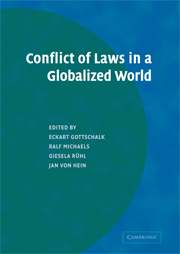Book contents
- Frontmatter
- Contents
- Preface
- Bibliographical Note
- Contributors
- SECTION I REMEMBERING ARTHUR TAYLOR VON MEHREN
- SECTION II TRANSATLANTIC LITIGATION AND JUDICIAL COOPERATION IN CIVIL AND COMMERCIAL MATTERS
- SECTION III CHOICE OF LAW IN TRANSATLANTIC RELATIONSHIPS
- 9 Party Autonomy in the Private International Law of Contracts: Transatlantic Convergence and Economic Efficiency
- 10 The Law Applicable to Intellectual Property Rights: Is the Lex Loci Protectionis a Pertinent Choice-of-Law Approach?
- 11 The Extraterritorial Reach of Antitrust Law between Legal Imperialism and Harmonious Coexistence: The Empagran Judgment of the U.S. Supreme Court from a European Perspective
- 12 Mandatory Elements of the Choice-of-Law Process in International Arbitration: Some Reflections on Teubnerian and Kelsenian Legal Theory
- 13 Application of Foreign Law to Determine Punitive Damages: A Recent U.S. Court Contribution to Choice-of-Law Evolution
- Index
11 - The Extraterritorial Reach of Antitrust Law between Legal Imperialism and Harmonious Coexistence: The Empagran Judgment of the U.S. Supreme Court from a European Perspective
Published online by Cambridge University Press: 08 September 2009
- Frontmatter
- Contents
- Preface
- Bibliographical Note
- Contributors
- SECTION I REMEMBERING ARTHUR TAYLOR VON MEHREN
- SECTION II TRANSATLANTIC LITIGATION AND JUDICIAL COOPERATION IN CIVIL AND COMMERCIAL MATTERS
- SECTION III CHOICE OF LAW IN TRANSATLANTIC RELATIONSHIPS
- 9 Party Autonomy in the Private International Law of Contracts: Transatlantic Convergence and Economic Efficiency
- 10 The Law Applicable to Intellectual Property Rights: Is the Lex Loci Protectionis a Pertinent Choice-of-Law Approach?
- 11 The Extraterritorial Reach of Antitrust Law between Legal Imperialism and Harmonious Coexistence: The Empagran Judgment of the U.S. Supreme Court from a European Perspective
- 12 Mandatory Elements of the Choice-of-Law Process in International Arbitration: Some Reflections on Teubnerian and Kelsenian Legal Theory
- 13 Application of Foreign Law to Determine Punitive Damages: A Recent U.S. Court Contribution to Choice-of-Law Evolution
- Index
Summary
INTRODUCTION
Antitrust law at the beginning of the twenty-first century is characterized by a dilemma. The forces of globalization cause markets to integrate on a worldwide scale. Economic activities become ever more international and are less and less bound to national borders. Value chains are “sliced up,” which means that products are not produced at one location but at various sites spread around the globe. Competition law, though, remains fundamentally in the hands of national legislators, courts, and authorities. Although international rules abound in other areas of economic law, they are only of marginal importance in antitrust. There is no international merger regime and there is no comprehensive set of multilateral rules to combat globally operating cartels that fix prices and allocate territories to the detriment of consumers. As a consequence, competition problems, which are the result of growing transborder economic activity, are dealt with, primarily, on the national, state level.
The recent Empagran affair is a case in point. It started with the global vitamins cartel that had operated from 1989 until 1999 and had caused massive economic losses. There are currently no binding international rules, including customary international law, prohibiting the formation of cartels. Thus, charges against the cartel's participants had to be pursued under national law. Some of these charges led to the imposition of record-breaking fines by competition authorities in the United States, the European Union, Australia, Canada, and Korea.
- Type
- Chapter
- Information
- Conflict of Laws in a Globalized World , pp. 220 - 242Publisher: Cambridge University PressPrint publication year: 2007



